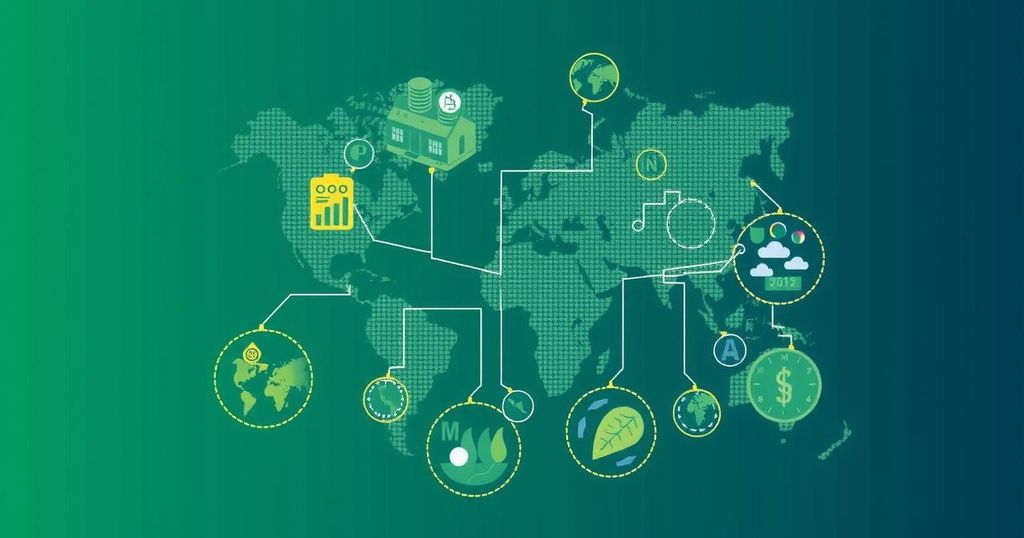JBS Seeks Public Funding for Climate Initiatives Amid Emission Concerns

JBS S.A., a leading meat production company, is advocating for more public funding to combat climate change despite its significant role in greenhouse gas emissions. CEO Gilberto Tomazoni emphasized the need for significant investment in agriculture and criticized the minimal attention given to this sector in climate initiatives. However, many experts dispute the industry’s claims and argue for prioritizing sustainability in agricultural practices.
JBS S.A., the foremost global meat processing corporation, with a reported net revenue of $3.1 billion in the second quarter of 2024, is pursuing additional funds to address the implications of climate change. Gilberto Tomazoni, the company’s global Chief Executive Officer, asserted that a mere four percent of investments targeting climate effort focus on agriculture and food systems. He emphasized agriculture’s significant potential for carbon capture while estimating the financial requirements for transformation at approximately $300 to $350 billion. In Brazil, where the meat industry contributes significantly to greenhouse gas emissions, Tomazoni’s efforts to reposition the meat sector as a key ally in the fight against climate change are noteworthy. Scientific assessments indicate that livestock account for 28 percent of Brazil’s emissions, primarily through methane production from cattle and the deforestation linked to ranching. Tomazoni’s advocacy for enhanced investment in agribusiness aligns with broader tactics among agricultural conglomerates aimed at portraying themselves as crucial participants in mitigating global warming during multilateral discussions, including the G20 November 18-19 in Rio de Janeiro. The International Monetary Fund and World Bank’s commitment, made in October to double investments in “climate-smart” agriculture, hopes to reach $9 billion annually by 2030. Agribusiness has been reliant on entrenched yet flawed arguments favoring increased production while simultaneously neglecting the crucial aspect of reducing meat consumption. Such companies argue that livestock supports soil health, thereby facilitating carbon storage; however, scientists caution against relying on soil as a valid long-term carbon sequestration method. The industry’s contention that it plays a vital role in alleviating hunger and securing food in the Global South has also been met with skepticism. The United Nations Committee on World Food Security indicates that hunger primarily stems from power dynamics, access, and distribution issues rather than food scarcity itself. Notably, Tomazoni was instrumental in the B20 Food Systems and Sustainable Agriculture Task Force, which includes representatives from major agribusiness firms, advocating for agricultural interests at the G20. The task force successfully influenced discussions, with a reported 75 percent of its recommendations being integrated into a joint declaration by G20 Agriculture ministers. Moreover, the B20’s call for a transparent and equitable multilateral trading structure aligns with agribusiness objectives amidst scrutiny from the new European Union Deforestation-Free Products Regulation, effective January 2025. This regulation prohibits imports from deforested areas post-2020, leading to criticisms from Brazilian agricultural representatives who argue that it embodies disguised protectionist motives. Experts, however, have labeled the industry’s request for public investment as unreasonable, noting that livestock production, growing by 29 percent annually, ought to invest in reducing its ecological impact directly. The alarming trend of rising agricultural greenhouse gas emissions in Brazil is underscored by a report from the Climate Observatory, indicating record emissions for the fourth consecutive year, propelled chiefly by cattle herd expansion. Proposed strategies among scientists to mitigate emissions include capping herd sizes and implementing early cattle slaughter to lower emissions. Additionally, livestock is responsible for 77 percent of deforestation in the Amazon, providing further evidence of agriculture’s critical role in the climate crisis.
The discussion surrounding the role of JBS S.A., the world’s largest meatpacker, in combating climate change comes at a pivotal moment as global awareness of agricultural contributions to greenhouse gas emissions increases. The corporation’s call for public funding underscores a strategic shift among agricultural giants to present themselves as key players in environmental mitigation efforts. The background of deforestation and livestock-related emissions in Brazil adds context to these claims, revealing the tangled relationship between agribusiness practices and environmental sustainability. Amidst international gatherings like the G20, the pressure on the agricultural sector to propose viable solutions for food security and environmental concerns intensifies, while debates surrounding food systems highlight the need for systemic change rather than superficial investments.
In conclusion, JBS S.A. is seeking substantial public investment to position the meat industry as an essential player in addressing climate change. However, the significant emissions attributed to livestock production in Brazil complicate this narrative. While the company advocates for increased funding to evolve agricultural practices, many experts challenge the legitimacy of this approach, arguing that true sustainability requires a reevaluation of livestock operations and substantial investments in alternative agricultural models. As global debates unfold, the balance between agricultural advancement and ecological responsibility remains crucial.
Original Source: www.desmog.com






